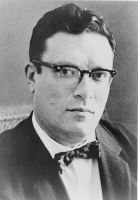yuèdòuài sà kè · ài xī mò fū Isaac Asimovzài小说之家dezuòpǐn!!! | |||
「 jī dì」、「 wǒ, jī qì rén」 děng xì liè shì 'ài xī mò fū zuì kuài zhì rén kǒu de dài biǎo zuò。 zhè xiē kàn sì gè zì dú lì de gù shì, xiāng hù guàn chuàn qǐ lái, jìng shì yī bù
ài xī mò fū bù jǐn shì gē lún bǐ yà dà xué de huà xué bó shì, gèng shì shì wén míng de quán néng zuò jiā, yī shēng zhù shù duō dá bǎi qī shí yú běn, nèi róng guǎng jí kē xué lèi de shù lǐ huà、 tiān wén、 shēng wù、 yī xué, hái bàng shè rén wén lèi de wén xué、 zōng jiào、 shǐ dì děng。 rú cǐ yuān bó de xué shí shǐ tā de bǐ xià shì jiè jù bèi liǎo qí huàn de xiǎng xiàng yǔ gāo dù de yù yán xìng。 zài tā gāng kāi shǐ xiě jī qì rén xiǎo shuō shí, jī qì rén xué wèi fā zhǎn chū lái; děng dào zhè mén kē jì fā zhǎn dé xiāng dāng yòu chéng guǒ shí, jīhū měi yī běn yòu guān jī qì rén xué fā zhǎn shǐ de shū jí dū tí dào tā、 tā de xiǎo shuō yǔ tā fā míng de「 jī qì rén sān dìng lǜ」。 zhè dìng lǜ jīhū chéng liǎo yǐ hòu kē huàn zuò jiā chuàng zuò yòu guān jī qì rén de zuò pǐn shí bì xū zūn xún de fǎ zé。
ài xī mò fū yǐ zhēn què de wù zhì kē xué jí rén wén xiàn xiàng yǎn yì chū tā de kē huàn shì jiè, yòu zá jìn zhēn tàn yǔ tuī lǐ de xiǎo shuō jì fǎ, shǐ dé tā de zuò pǐn qíng jié shēng dòng, kòu rén xīn xián, ràng rén bù rěn shì juàn。
Isaac Asimov is widely considered a master of the science-fiction genre and, along with Robert A. Heinlein and Arthur C. Clarke, he was considered one of the "Big Three" science-fiction writers during his lifetime. Asimov's most famous work is the Foundation Series; his other major series are the Galactic Empire series and the Robot series, both of which he later tied into the same fictional universe as the Foundation Series to create a unified "future history" for his stories much like those pioneered by Robert A. Heinlein and previously produced by Cordwainer Smith and Poul Anderson. He penned numerous short stories, among them "Nightfall", which in 1964 was voted by the Science Fiction Writers of America the best short science fiction story of all time, an accolade that many still find persuasive. Asimov wrote the Lucky Starr series of juvenile science-fiction novels using the pen name Paul French.
The prolific Asimov also wrote mysteries and fantasy, as well as much non-fiction. Most of his popularized science books explain scientific concepts in a historical way, going as far back as possible to a time when the science in question was at its simplest stage. He often provides nationalities, birth dates, and death dates for the scientists he mentions, as well as etymologies and pronunciation guides for technical terms. Examples include his Guide to Science, the three volume set Understanding Physics, Asimov's Chronology of Science and Discovery, as well as numerous works on astronomy, mathematics, the Bible, William Shakespeare's works and, of course, chemistry subjects.
Asimov was a long-time member and Vice President of Mensa International, albeit reluctantly; he described some members of that organization as "brain-proud and aggressive about their IQs." He took more joy in being president of the American Humanist Association. The asteroid 5020 Asimov, a crater on the planet Mars, the magazine Asimov's Science Fiction, a Brooklyn, New York elementary school, and one Isaac Asimov literary award are named in his honor.
